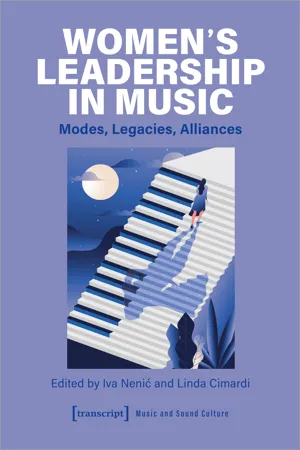
Musik und Klangkultur
Modes, Legacies, Alliances
- 310 pages
- English
- PDF
- Available on iOS & Android
About This Book
Various modes of women's contemporary cultural, social and political leadership can be found in music. Informed by different histories and culturally bound social mores but also by a comparative perspective, the contributors of this volume ask what can be considered leadership in culture from women's point of view. They deconstruct the notion of leadership as corporative and career-related modes of success by showing how women's agency, power and negotiation in and through music can and should be considered as empowering, transformative and role-modeling. By interweaving several disciplinary perspectives - from ethnomusicology, musicology and cultural management to sociology and anthropology - this volume aims to substantially contribute to the study of women's leadership.
Frequently asked questions
Information
Table of contents
- Cover
- Contents
- Introduction. Women’s Modes, Legacies and Futures in Music
- Uneven Terrains of Struggle: Towards the Transformative Notion of Female Music Leadership
- Between Home and International Scenes. Sarah Ndagire’s Way to World Music
- Plucking a Liberal Sound: Japanese Women’s Resignification of Finnish Kantele in a Hobbyist Club
- Female Balkan Romani Singers: Charting Innovative Performance Paths
- Assumptions of Normality: How Three Women with a Disability Changed the Face of Music
- Female Leadership in Iranian‐Arab Shiʻa Rituals from Khorramshahr, South‐western Iran
- God Has a Woman’s Voice. Liturgical Music and Agency of Eastern European Migrant Women in Rome
- Winds of Change? Gender Segregation in Music Education and Production in Italy
- Introducing WMLON: The Women’s Musical Leadership Online Network
- Women in Music: Possibilities and Responsibilities of Cultural Management and Policy
- Women’s Role in Sustaining the Practice of Tamburitza Instruments in Vojvodina
- Performing Trauma in Privileged Spaces: Empowering Turkish Women’s Voices of the Past
- Women’s Actions to Revitalize the Practice of Kaval Playing in Serbia
- Female Leadership in Serbian Metal Music. Frontwomen at the Crossroads of Visibility, Genre and Voice
- Female Agency, Genres and Aesthetics of Sorrow in Persian Classical Music
- “What Moves the World, Moves My Ass as Well”: Mimi Mercedez as an Anti‐heroine of Postsocialist Serbia
- Notes on Contributors